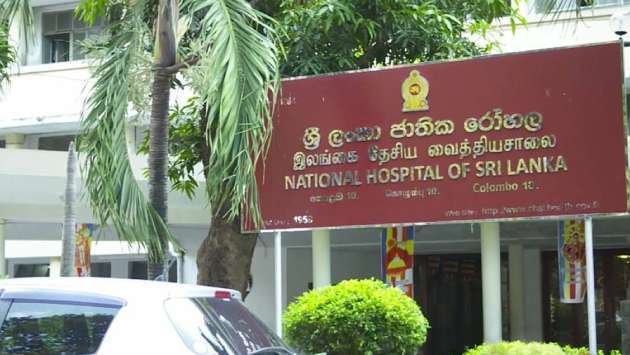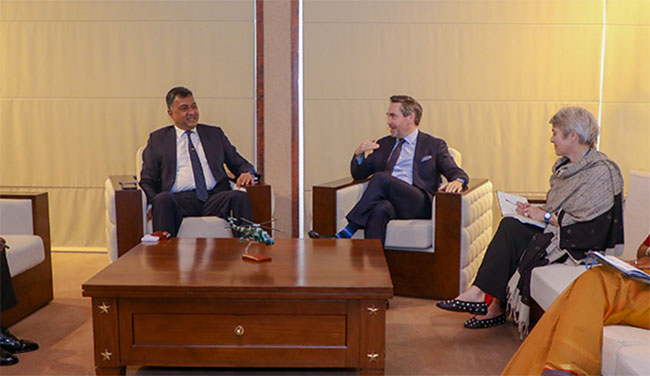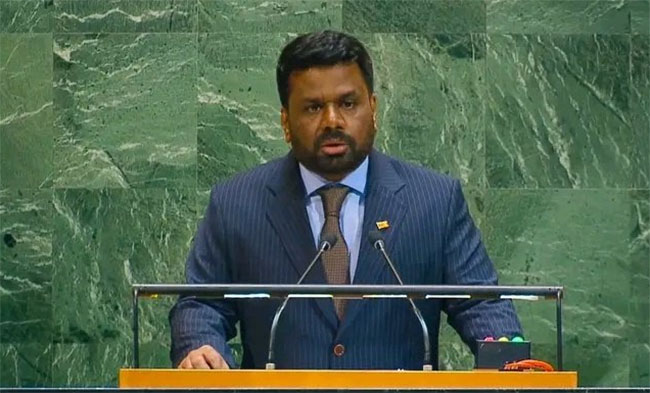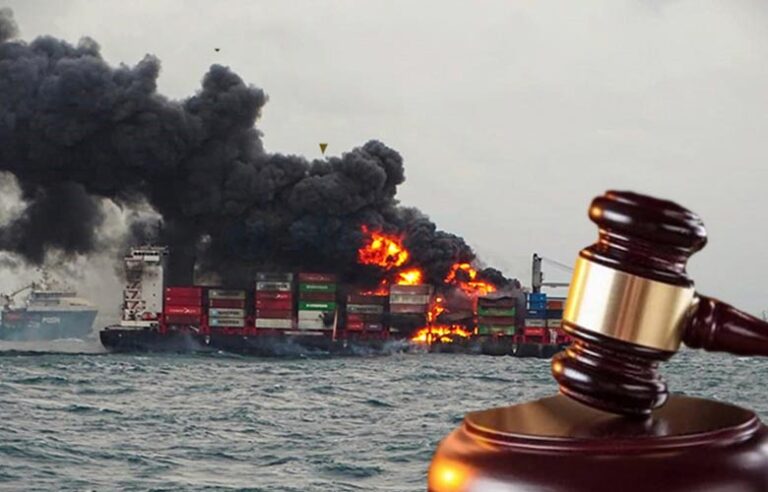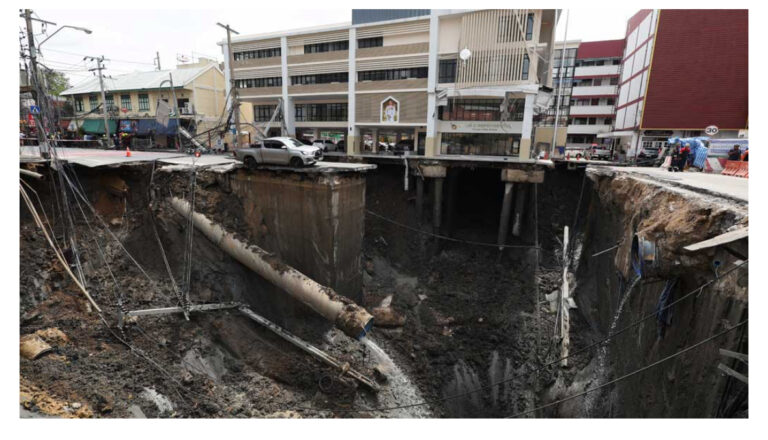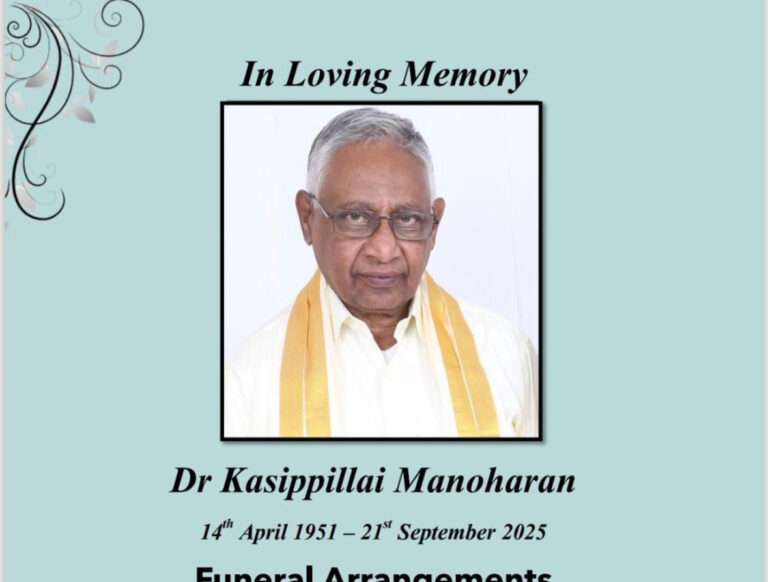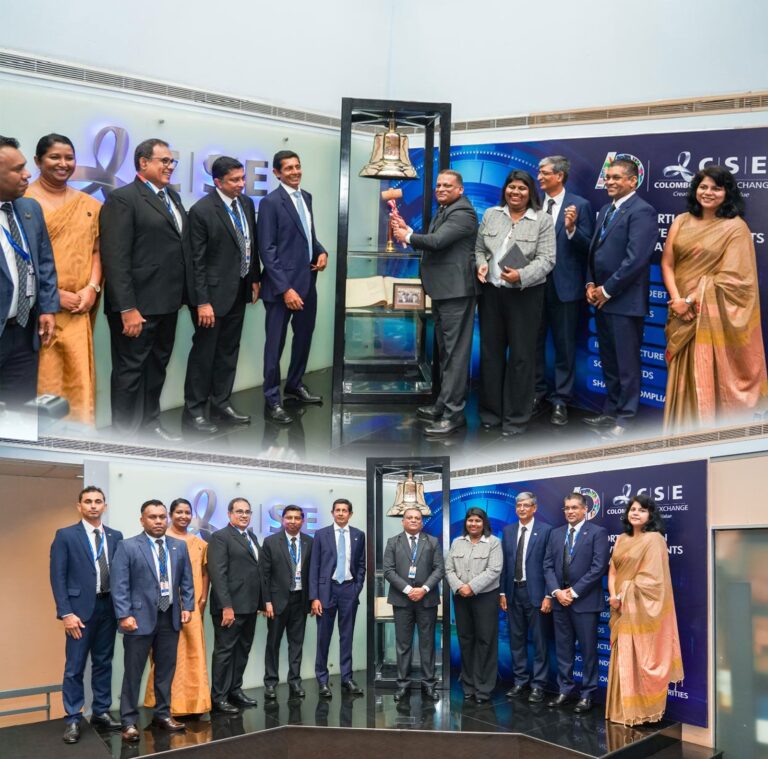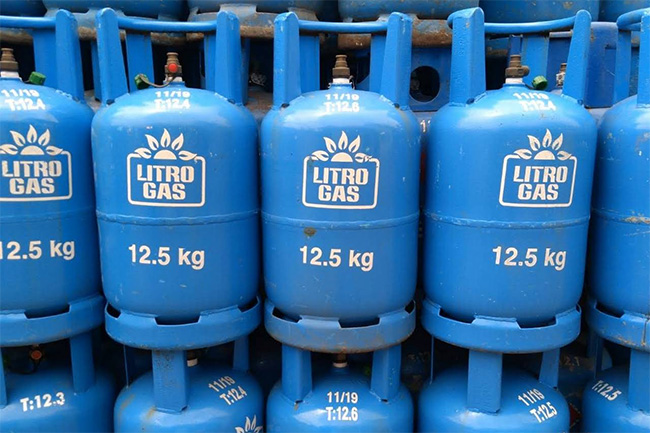September 25, Colombo (LNW): Authorities have opened a formal investigation into allegations of large-scale procurement fraud at Colombo National Hospital, centring around the purchase and potential misuse of laboratory reagents valued at over Rs. 2.5 billion.
The inquiry, spearheaded by Sri Lanka’s Commission to Investigate Allegations of Bribery or Corruption, will focus on claims that substandard, expired, or nearly expired chemical reagents were acquired through questionable procurement practices.
Concerns have also been raised regarding the lack of proper standardisation protocols and the alleged monopolisation of contracts by a single private supplier.
According to a statement released by the Commission, investigators will examine how such purchases were authorised, whether due diligence was followed, and whether public funds were knowingly misused in the acquisition of faulty or soon-to-expire materials.
At the centre of the unfolding controversy are several high-ranking figures in the health sector. Among those implicated are the current Secretary to the Ministry of Health, a former Deputy Director General of Health Services attached to the National Hospital, senior consultants, and technical staff working in the hospital’s laboratories.
These individuals are suspected of facilitating or turning a blind eye to a procurement process that allegedly favoured a specific company without due competitive bidding or proper quality assessment.
The case has come to light following a formal complaint lodged by Dr Chamal Sanjeewa, a medical specialist who had previously raised alarm bells over persistent irregularities in hospital supply chains. His initial reports were submitted to both the Criminal Investigation Department (CID) and the Bribery Commission, citing systemic failures and lack of transparency in how critical medical supplies were being handled.
The CID, having already begun gathering preliminary testimony, is said to be working in parallel with the Bribery Commission as the investigation deepens. Dr Sanjeewa has publicly voiced frustration over institutional delays in addressing what he described as a serious risk to patient safety and public trust.
Major Corruption Probe Launched into Suspected Irregularities at Colombo National Hospital
Sri Lanka and United Nations Explore Deeper Ties in Peacekeeping and Human Rights Cooperation
September 25, Colombo (LNW): In a significant move aimed at reinforcing international collaboration, a senior delegation from the United Nations held extensive discussions with Sri Lanka’s Ministry of Defence yesterday (24), focusing on expanding cooperation in global peacekeeping operations and reinforcing human rights initiatives.
The meeting took place at the Ministry of Defence headquarters in Colombo and was led by Marc-André Franche, the United Nations Resident Coordinator in Sri Lanka, accompanied by Karen Whiting, Deputy Director for Protection and Solutions at the UNHCR Regional Bureau for Asia and the Pacific.
They were welcomed by Air Vice Marshal Sampath Thuyacontha (Retired), Secretary to the Ministry of Defence.
Discussions centred on a shared vision to further develop Sri Lanka’s involvement in UN peacekeeping missions. Particular emphasis was placed on streamlining the deployment process through faster and more rigorous screening procedures, enhancing pre-deployment training, and ensuring that deployed personnel are equipped with tools and resources that meet United Nations standards.
Both parties stressed the importance of maintaining operational readiness and professionalism in line with evolving international demands.
The delegation also touched on matters of broader concern, including the role of human rights in peacekeeping contexts. Franche expressed the UN’s recognition of Sri Lanka’s continuing efforts to reinforce human rights frameworks and its engagement with global governance norms.
He welcomed the island nation’s willingness to strengthen its peacekeeping infrastructure while aligning its policies with the broader mandates of the United Nations.
Air Vice Marshal Thuyacontha reiterated Sri Lanka’s commitment to multilateral engagement, underlining the country’s dedication to serving in peacekeeping capacities with discipline, transparency, and a respect for global humanitarian standards. He noted that Sri Lankan forces have a long history of serving under the UN banner and conveyed the government’s aspiration to play a more active role in future missions.
President AKD Calls for Global Unity in Address to UN, Urges Immediate Action on Gaza and Global Crises
September 25, Colombo (LNW): In a powerful address to the 80th United Nations General Assembly in New York, Sri Lankan President Anura Kumara Dissanayake made an impassioned plea for international unity in the face of escalating global challenges.
Speaking during the morning session on the 25th (Sri Lanka time), the President called on global leaders to embrace a shared responsibility for creating a secure and humane world for generations yet to come.
President Dissanayake began by drawing urgent attention to the deepening humanitarian disaster in the Gaza Strip, condemning the ongoing violence and loss of innocent lives. He issued a stern appeal for an immediate cessation of hostilities, the unobstructed flow of humanitarian assistance, and the release of all hostages in accordance with resolutions brokered by the United Nations and other international actors. Stressing the severity of the crisis, he called on the international community to apply meaningful pressure to stop the bloodshed and to act with resolve and compassion.
Beyond the crisis in Gaza, the President addressed a broader spectrum of global issues, describing poverty as an enduring blight that continues to breed inequality and instability across nations. He urged world leaders to treat poverty not as an isolated domestic issue, but as a systemic global emergency that demands coordinated and decisive action. In his view, economic disparity and social marginalisation represent moral failures that fuel conflict, disillusionment and extremism.
Turning to the issue of narcotics, President Dissanayake warned of the far-reaching consequences of the global drug trade, describing it as a corrosive force that jeopardises public health, undermines democratic institutions and threatens societal cohesion. He pointed to Sri Lanka’s own multi-pronged approach to combating drug abuse—focusing on stricter border control, legal reform, and expanded rehabilitation infrastructure—as a potential model for international cooperation. He called for a collective global initiative that tackles drug trafficking at its roots and prioritises the rehabilitation of those afflicted by addiction.
On the topic of corruption, the President characterised it as a pernicious enemy of development, equity and democracy. He stressed that corruption entrenches poverty and thwarts progress, highlighting Sri Lanka’s commitment to building a transparent and ethical governance framework. Acknowledging the difficulty of this task, he nonetheless declared it an essential battle in the effort to create just and prosperous societies. He encouraged nations to embed a culture of integrity within public institutions and to foster civic trust through transparency and accountability.
In his closing remarks, President Dissanayake spoke of the Sri Lankan people’s determination to build a brighter future founded on dignity and justice. He reaffirmed the country’s commitment to a vision of national renewal under the banner of “A Thriving Nation – A Beautiful Life,” a concept rooted in ethical governance, digital innovation, environmental responsibility, and equitable access to education and healthcare. The President noted that these goals are being pursued with determination and unity, aiming to transform Sri Lanka into a model of sustainable, inclusive progress.
Full Speech:
Madam President, Mr. General Secretary, honoured invitees and distinguished delegates,
Allow me, Madame Annalena Baerbock, representing the beautiful country of Germany, to begin my speech by offering my warmest congratulations to you on being elected the President of the 80th session of this organisation, formed with the noble aim of bringing about a just and lasting peace among the nations of the world.
I would also like to use this opportunity to express my country’s appreciation to His Excellency Philemon Young for the exceptional leadership he provided during the 79th session. We are gathered here today to plan the future path of this organisation, which has worked tirelessly for eight decades to bring about a world of peace.
It is my honour to address this August Assembly for the first time as the President of Sri Lanka.
As representatives of nations, we all bear the responsibility to work towards fulfilling the aspirations of our people. The decisions we make now will impact people across the world and play a decisive role in the future of this planet, our common home.
Distinguished delegates,
Our decisions will have a very important impact on our future. Poverty, a tragedy as old as human civilisation, has accompanied humankind on its journey through time. For centuries, countries across the world have faced this painful and relentless struggle. Poverty and problems stemming from it are also casting an oppressive shadow on our future. This assembly must pay special attention to eradicate extreme poverty. I believe our conscience dictates us to do so.
Distinguished delegates,
For centuries, many countries in the world are struggling against poverty. Poverty is a terrible enemy with many faces. Even as we gather here in the countries we represent, including in my own, children are suffering from hunger. A child’s right to education is an internationally accepted fundamental right.
This right is enshrined in the constitutions of most of our nations. Yet, across the world, poverty has denied this right to hundreds of thousands of children. In a world which boasts of its technological advances, how can there be children without access to education? Education is the foundation of every great nation.
It is the most vital factor deciding one’s future. We firmly believe that investment in education is an investment in global progress. Many developing countries are constrained in their struggle against poverty by indebtedness.
Low-income countries allocate twice as much on debt servicing than on education or healthcare.
Our people and our countries are caught in debt traps. The 2030 Agenda for Sustainable Development pledges to leave no one behind and to reach the last first. The Agenda acknowledges the most critical challenge before the world is the challenge to end poverty.
I would also like to recall the decisions taken at the Global Summit for Social Development in Copenhagen in 1995.
However, wars and political upheavals and the COVID pandemic have obstructed the fulfilment of these hopeful agendas. I propose to you that the time has come to accept that inequality and poverty are a global catastrophe and we should act accordingly.
Madam President, esteemed guests,
Drugs and organised crimes linked to drugs have become a serious concern to this world. This has been acknowledged in the World Drug Report 2025 published by the United Nations Office on Drugs and Crime.
The drug problem is a complex issue affecting millions of people globally. The market for drugs and the related criminal organisations are creating issues globally. Drug cartels are turning entire states into their hunting grounds. They pose a major threat to global health and politics and eventually global well-being as well.
While Sri Lanka is taking effective steps to address this challenge, I respectfully request all of you to join in the effort to implement the global agenda on drugs and crime.
I bring to your notice the need to implement the law strictly against these drug traffickers and prevent drug traffickers from taking refuge in our countries and also to set up rehabilitation centres for rehabilitation purposes.
Madam President, honoured guests,
We regard corruption as an epidemic causing widespread harm to broad swathes of society. We believe corruption to be an obstruction for development, a decisive threat to democracy and global well-being and also a cause for poverty. Let me remind you that fighting corruption is dangerous, but not fighting corruption is even more dangerous.
The Universal Declaration of Human Rights of 1948 was a remarkable victory for the people of the world. Civilisational achievements were never accomplished overnight. They were all results of unwavering efforts and sacrifices. And the struggle against corruption is also a difficult one. We must take the necessary steps here. The first step may be difficult, but if the courageous first step we take is correct, a thousand steps will follow. That is what I believe.
Madam President, delegates, be brave. All the rest will follow.
Sri Javaharlal Nehru has once stated so. I represent a small island of nearly 22 million people. Sri Lanka’s population is about 0.30 of the global population. It is true that we are small in size and in numbers, yet we have begun the struggle against corruption for the future generations of our country and the world. I propose that an integral part of the culture of all UN member countries should be to fight against corruption.
Madam President,
I feel confident that all of you will join me in condemning war. There is no nation in the world that desires a war. The result of a war is a tragedy wherever it happens. We all know that. Even now, many countries of the world are experiencing the pain of that tragedy. As a country that lived through a three-decade war, we know well the futility of war. No one who sees the pain and the suffering of parents, spouses and children of the victims of war would never dream of another war.
We have witnessed these painful sights with our own eyes. Even as suffering caused by conflict has reached unprecedented levels, the international community has become reduced to bystanders.
Opportunistic power politics has turned the lives of children and innocent civilians into a game. No one has the right to inflict pain and suffering on another to enhance one’s own power. The duty of a ruler is not to destroy lives but to protect them.
We are deeply distressed by the ongoing catastrophe in the Gaza Strip. Gaza has been turned into an open prison full of pain and suffering, echoing with the cries of children and the innocent civilians. The United Nations Organisation and all related parties must work towards an immediate ceasefire, enable adequate humanitarian aid to these areas and to ensure the release of hostages of all parties. We recognise the Palestinian people’s inalienable right to their own state.
We also believe that legal, security and humanitarian concerns of Israel and Palestinian people need to be acknowledged.
Sri Lanka reiterates the importance of early implementation of the UN General Assembly resolutions regarding a two-state solution on the basis of the 1967 borders. The time has come for the international community to stop being a mere spectator and to move decisively to end the suffering of millions.
Religious extremism and racism have been major causes of wars and conflicts, bringing suffering to millions of people.
Although a century has passed since the abolition of slavery, the poison of racism still lingers in many places. Extremist and racist ideas are as deadly as epidemics. We must ask ourselves how these extremist and racist ideas survive like sparks under the ashes in a world that has witnessed so many advances on so many fronts.
I believe that we must awaken our conscience to oppose racism and religious extremism in protection of human rights and freedoms. We must be brave enough to speak up for peace. We must not be afraid to speak up against war. We must be afraid to speak up for war. In a world where millions of children die of hunger, we spend millions on weapons. When tens of millions die of inadequate health facilities, hundreds of millions are spent on futile wars. When hundreds of thousands of children are denied the right to an education, millions are spent on invading another’s land.
If every inch of this world can be turned into peaceful communities, what a wonderful world would it be. As a country that suffered the horrors of war for decades, where families still weep in remembrance of their loved ones, we have a duty to make that heartfelt proposal.
I would like to remind you that at the last election, the people of Sri Lanka decided in favour of a centuries-old dream. A legislature has been established according to that decision, reflecting the ethnic and religious diversity of the country.
A parliament has been established with women and other marginalised communities in representation. We believe that the duty of legislatures is to develop the country and the people, not to develop themselves. And we have established that idea.
Madam President, distinguished guests,
Our people have chosen light over darkness. They have given their approval to realise the vision of a thriving nation, a beautiful life. To fulfil this historic mandate, we have focused on establishing non-corrupt administration, poverty eradication, and digitalisation. And we have also placed great emphasis on education health as well. We are moving towards these goals step by step. Digital democracy is one of our aims.
Ensuring that every person and every country can enjoy the opportunities of the digital age is a global challenge. If we succeed in our task, we will be able to open doors to technology, accelerate development, and to strengthen governance. If we fail, technology will turn into one more force, worsening inequality, insecurity, and injustice.
The digital gap between states that can and cannot establish access to digital tools is clear. An even greater gap is being created in relation to artificial intelligence. Sri Lanka and many other developing nations in Asia and also many other nations are facing challenges in using AI as a development tool due to the inadequate infrastructure facilities.
Madam President, distinguished delegates,
I ask the international community to work together and we have to develop a dignified society, a dignified world. I present this August assembly a proposal to set up a neutral sovereign Artificial Intelligence zone. We must build a new and better world, a world which represents the dignity of humankind. You as members of this assembly must be the architects of that better world.
As President Harry Truman stated on the occasion of founding the United Nations, in your hands rests our future. We must not act in fear or under compulsion, but with hope for a better and more secure world.
Today we must commit ourselves not to lead the world to another disaster, but to make it a better place for the next generation.
I have dreams and expectations for my country. Similarly, you have dreams and expectations for your countries. My dream is to ensure that my people are rich and they have happiness. I believe that you too have such dreams. We must try to achieve these dreams not in competition with each other, but by working arm in arm, peace, dignity, and equality on a healthy planet. That is the motto of the United Nations organisation. Therefore, let us become the true healers of the world.
Heavy falls about 100 mm expected: Strong winds likely to occur (Sep 25)
September 25, Colombo (LNW): Showers will occur at times in Western, Sabaragamuwa and North-western provinces and in Galle, Matara, Kandy and Nuwara-Eliya districts, with heavy falls of about 100 mm expected at some places, the Department of Meteorology said in its daily weather forecast today (25).
A few showers may occur in North-central province.
Showers or thundershowers are likely at a few places in Uva province and in Ampara and Batticaloa districts after 2.00 p.m.
Fairly strong winds of about (40-50) kmph can be expected at times over Western slopes of the central hills and in Central, Northern, North-central and North-western provinces and in Trincomalee and Hambantota districts.
The general public is kindly requested to take adequate precautions to minimise damages caused by lightning and temporary localised strong winds during thundershowers.
Marine Weather:
Condition of Rain:
Showers will occur at several places in the sea areas off the coast extending from Puttalam to Matara via Colombo and Galle.
Winds:
Winds will be south-westerly and wind speed will be (30-40) kmph.
Wind speed can increase up to (55-65) kmph at times in the sea areas off the coast extending from Galle to Pottuvil via Matara and Hambantota and from Puttalam to Kankasanthurai via Mannar.
Wind speed can increase up to (50-55) kmph at times in the sea areas off the coast extending from Puttalam to Galle via Colombo and from Kankasanthurai to Trincomalee.
State of Sea:
The sea areas off the coast extending from Galle to Pottuvil via Matara and Hambantota and from Puttalam to Kankasanthurai via Mannar will be rough to very rough at times.
The sea areas off the coast extending from Puttalam to Galle via Colombo and from Kankasanthurai to Trincomalee may be rough at times.
Naval and fishing communities are requested to be vigilant in this regard.
Sri Lanka’s $1 Billion Claim Against X-Press Feeders: A Legal Battle Beyond Borders
By: Ovindi Vishmika
September 24, Colombo (LNW): When Sri Lanka’s Supreme Court in July ordered Singapore-based shipping company X-Press Feeders to pay US$1 billion in damages for the catastrophic sinking of the MV X-Press Pearl, it marked one of the most significant environmental rulings in the country’s history. The 2021 disaster saw tonnes of plastic pellets, lead ingots, and hazardous chemicals spill into the ocean after a nitric acid leak caused a devastating fire onboard the vessel.
The decision was celebrated domestically as a victory for communities and ecosystems devastated by the disaster. Yet, just weeks before the first US$250 million tranche of compensation was due, X-Press Feeders publicly announced it would refuse to pay. Its Chief Executive Officer, Shmuel Yoskovitz, defended the stance on the grounds that honoring the judgment would “set a dangerous precedent” and undermine the principle of limitation of liability, a cornerstone of maritime law.
This open rejection not only raises questions of corporate accountability but also spotlights a complex legal puzzle: What happens when a sovereign court’s decision collides with international legal boundaries?
Jurisdiction Meets International Boundaries
The jurisdictional reach of a national court is powerful within its own borders but limited beyond them. In Sri Lanka, the Supreme Court is the highest authority, and its rulings carry unquestionable weight for those present within the country. X-Press Feeders, however, is domiciled in Singapore and operates globally, meaning the Colombo ruling cannot automatically bind the company abroad.
The case exemplifies the tension between territorial jurisdiction and the realities of cross-border commerce. Sri Lanka can validly claim jurisdiction because the damage occurred in its waters, but enforcing this ruling outside Sri Lanka is another matter altogether.
Adding to the complexity, London’s Admiralty Court last year capped X-Press Feeders’ liability at £19 million (US$25 million) under international maritime conventions, while Sri Lanka’s ruling seeks an initial US$1 billion with further damages possible. The clash of outcomes demonstrates how different jurisdictions can produce vastly divergent legal obligations, leaving victims caught in the middle.
Pathways for Enforcement
The refusal leaves Sri Lanka with several possible,though challenging,legal avenues. So, what options does Sri Lanka have when its highest court’s decision is flatly rejected?
First, Colombo could attempt to enforce the judgment in Singapore or other countries where X-Press Feeders has assets. But without a reciprocity treaty between Sri Lanka and Singapore, the courts there are under no obligation to recognise the ruling. In fact, Singapore may resist on the grounds that Sri Lanka’s order conflicts with the Convention on Limitation of Liability for Maritime Claims, a global framework designed to shield shipowners from unlimited financial exposure.
Second, Sri Lanka could seek diplomatic engagement. This approach would elevate the matter to a state-to-state level, pressing Singapore to encourage its company to negotiate a settlement. It is here that Sri Lanka could frame the case not only as a financial dispute but also as a matter of environmental justice.
Third, there is the option of international arbitration or tribunals. The United Nations Convention on the Law of the Sea (UNCLOS) obliges states to protect the marine environment, and Sri Lanka could bring a claim before the International Tribunal for the Law of the Sea (ITLOS).
However, arbitration requires the consent of both parties, which may not be forthcoming from X-Press Feeders or Singapore.
Finally, Sri Lanka may turn to domestic criminal law as leverage. Already, the ship’s Russian captain has been barred from leaving Sri Lanka for more than four years. The Supreme Court has directed police and prosecutors to initiate criminal proceedings for non-compliance if responsible individuals are present in the country. Yet such measures are limited to those physically within Sri Lanka and do not touch the corporate entity itself.
Stakeholders in the Crossfire
The fallout extends beyond courtrooms and diplomatic corridors.For fisherfolk and coastal communities, the incident was devastating. Fishing bans imposed after the spill crippled livelihoods for months, and while cleanup operations have cleared visible plastic, long-term ecological damage remains. For them, the Supreme Court’s ruling symbolises long-awaited recognition of their suffering.
Environmental advocates caution that the damage is far from over. Hemantha Withanage of the Centre for Environmental Justice notes that while the coastline appears free of debris today, “the effects of the pollution will be felt for a long time.” Calls for comprehensive monitoring of marine ecosystems continue to grow.
Meanwhile, the global shipping industry views the ruling with alarm. If Sri Lanka’s approach were replicated elsewhere, shipowners could face crippling liabilities far beyond convention limits. The fear is that insurance premiums would skyrocket, raising shipping costs worldwide and ultimately burdening consumers.
International Pressure and the UN’s Role
Sri Lanka’s challenge is not only to seek justice domestically but also to mobilise the international community. The recent intervention by the United Nations office in Colombo expressed “deep concern” over X-Press Feeders’ refusal to comply, urging the company to recognise the magnitude of the harm caused to communities and ecosystems.
Such interventions highlight a possible avenue for Sri Lanka: to rally global opinion and cast the dispute as a test of corporate accountability in an era of increasing environmental disasters. By drawing in multilateral actors and framing the issue as a climate justice and sustainable oceans concern, Sri Lanka may be able to pressure Singapore and the company into reaching a settlement.
What Comes Next?
The Supreme Court’s judgment is clear, but its enforcement is uncertain. With no treaty framework to compel compliance abroad, Sri Lanka’s best hope may lie in diplomatic negotiations, international advocacy, and selective legal actions in foreign courts where the company holds assets.
Still, the refusal by X-Press Feeders exposes a sobering reality: even the highest courts of sovereign nations can struggle to hold multinational corporations accountable when jurisdictional boundaries intervene. For Sri Lanka, this is more than a legal dispute; it is a battle to ensure that corporate negligence does not escape justice simply because of geography.
For Sri Lanka, the path forward lies in a combination of law, diplomacy, and international advocacy. As the hearing scheduled for September 25 unfolds, the world will watch closely to see whether Sri Lanka can transform a domestic court ruling into a binding international outcome — or whether the MV X-Press Pearl becomes another reminder of the difficulties small states face in holding global corporations accountable.
Massive Sinkhole Disrupts Bangkok
A massive sinkhole measuring about 30 by 30 meters and 50 meters deep opened on Samsen Road in front of Vajira Hospital on Wednesday morning.
Several vehicles were damaged and nearby buildings, including the hospital and a police station, were evacuated as a precaution. Utilities were cut off and traffic in central Bangkok ground to a halt.
Officials say the collapse is likely linked to construction on the Purple Line railway project. No fatalities have been reported.
Authorities are working to stabilize the site and investigate the cause.
Voice Against Trincomalee Student Killings, Dr. Manoharan, Passes Away
By S V Kirubaharan
Very sad to here the news that Dr Kasippillai Manoharan passed away in UK on Sunday 21 September, 2025 Dr Manoharan is the father of Ragihar, one of the students murdered by the Sri Lankan Navy in Trincomaler on 2nd January 2006 .
Manohara fought very hard to find justice for the murder of his son, living in exile in UK due to the threat that he faced in Sri Lanka. He worked tirelessly with UN instituisons to find justice. But until today, none of the government in Sri Lanka did anything concern to the murder of these students in Trincomalee.
Let Dr Manoharan’s soul rest in peace.🌹💐🕉️✝️☸️☪️🌹💐
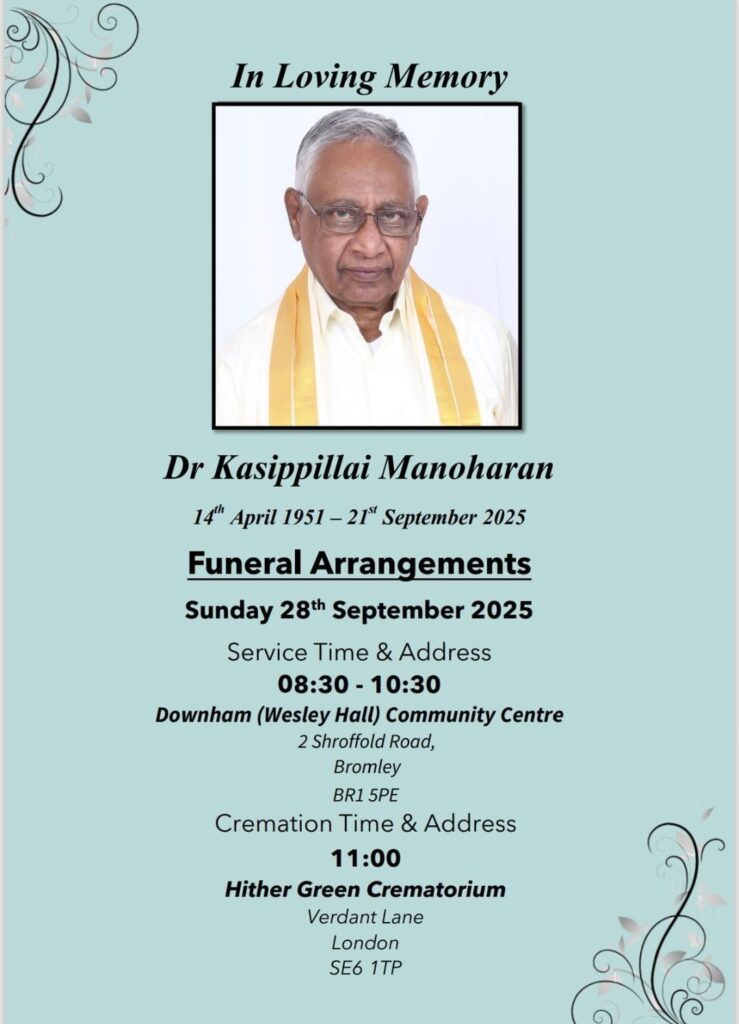
CDB Rings Bell at Colombo Stock Exchange Marking 30th Anniversary
Rashika Hennayake September 24, Colombo (LNW):
Reiterating its presence in financial excellence and innovation, leading NBFI in Sri Lanka Citizens Development Business Finance PLC (CDB) marked its 30th anniversary celebrations by ringing the bell to start the trading day at the Colombo Stock Exchange (CSE) on 9th September. With the ringing of the bell at the CSE, this digitally transformative pioneering trailblazer in the financial services industry in Sri Lanka ceremonially marked a new chapter in its continued growth and commitment to empowering a smarter, sustainable Sri Lanka.
The ringing of the bell is an iconic sound that reverberates across the trading floor and is a tradition organised by the Colombo Stock Exchange, signifying and celebrating the market’s resilience, which echoes CDB’s journey of three decades.
Delivering the welcome address, Vindhya Jayasekera, CEO – Designate of the Colombo Stock Exchange, congratulated CDB on this remarkable milestone. She remarked, “Marking 30 years is a true testament to CDB’s commitment to its customers, investors and the broader community. Listed on the CSE for nearly 15 years, CDB has built a strong and mutually beneficial relationship with capital markets – one that has been integral to its growth. The CSE is proud to support institutions that lead by example – upholding transparency, sound governance and contribute meaningfully to national development. Its journey over the past three decades highlights a remarkable contribution to the industry and the lives of Sri Lankans across the nation.”
Chairman of CDB PLC Alastair Corera remarked, “The ringing of the bell is one of the most rewarding and significant events in our thirty-year journey, which can be seen through the lens of both CDB’s pre- and post-listing on the CSE.” He added, “It is a sound that redefines corporate Sri Lanka, its resilience, its staying power and its commitment to create a better nation – all of which resonate with how we have etched our journey – from highs to lows, achievements, transformation and future vision.”
MD/CEO Mahesh Nanayakkara recalled CDB’s mammoth rebranding exercise in 2009 prior to the company’s listing on the CSE on 6th October 2010. “At the time of listing, CDB was less than an LKR 10 Bn balance sheet size entity in the first fifteen years of our journey. Subsequent to the listing, in the next fifteen years from 2011 to 2025, CDB recorded an exceptional growth trajectory of over 17 times – which now stands at over LKR 170 Bn in terms of total assets.”
Nanayakkara explained that CDB’s transformative journey began with a clear vision – to become a future-ready financial institution that is digitally driven, sound in its governance and compliance fundamentals and raising the bar of excellence continually to ensure all stakeholders are empowered in a sustainable ecosystem founded on People.Planet.Profit. “Our heartfelt appreciation to each of our stakeholders who have been the trusses supporting us in this journey, who have pushed us to constantly innovate and be true to our values and principles. Our customers have given us trust and confidence to march through turbulent times, while the communities we work with give us reason to create a better Sri Lanka. By ringing this bell, we bring all this and more into focus, not just our 30-year journey but also our next chapter that we are writing to make this nation and our planet better.”
Image Caption:
MD/CEO of CDB PLC, Mahesh Nanayakkara, marked the company’s 30th anniversary by ringing the bell to open trading at the CSE, alongside CDB PLC Chairman Alastair Corera. Joining them are Executive Director – Sales and Business Development Sasindra Munasinghe, Executive Director – Business Operations Dave De Silva, Chief Support Service Officer Nayanthi Kodagoda, Chief Sales and Digital Business Officer (Director Designate) Hasitha Dassanayake, Chief Financial Officer Ruwan Chandrajith, Executive Director, Corporate Finance Roshan Abeygoonewadena, Deputy CEO and Executive Director Damith Tennakoon with CEO-Designate of CSE Vindhya Jayasekera and Chief Regulatory Officer Nilupa Perera
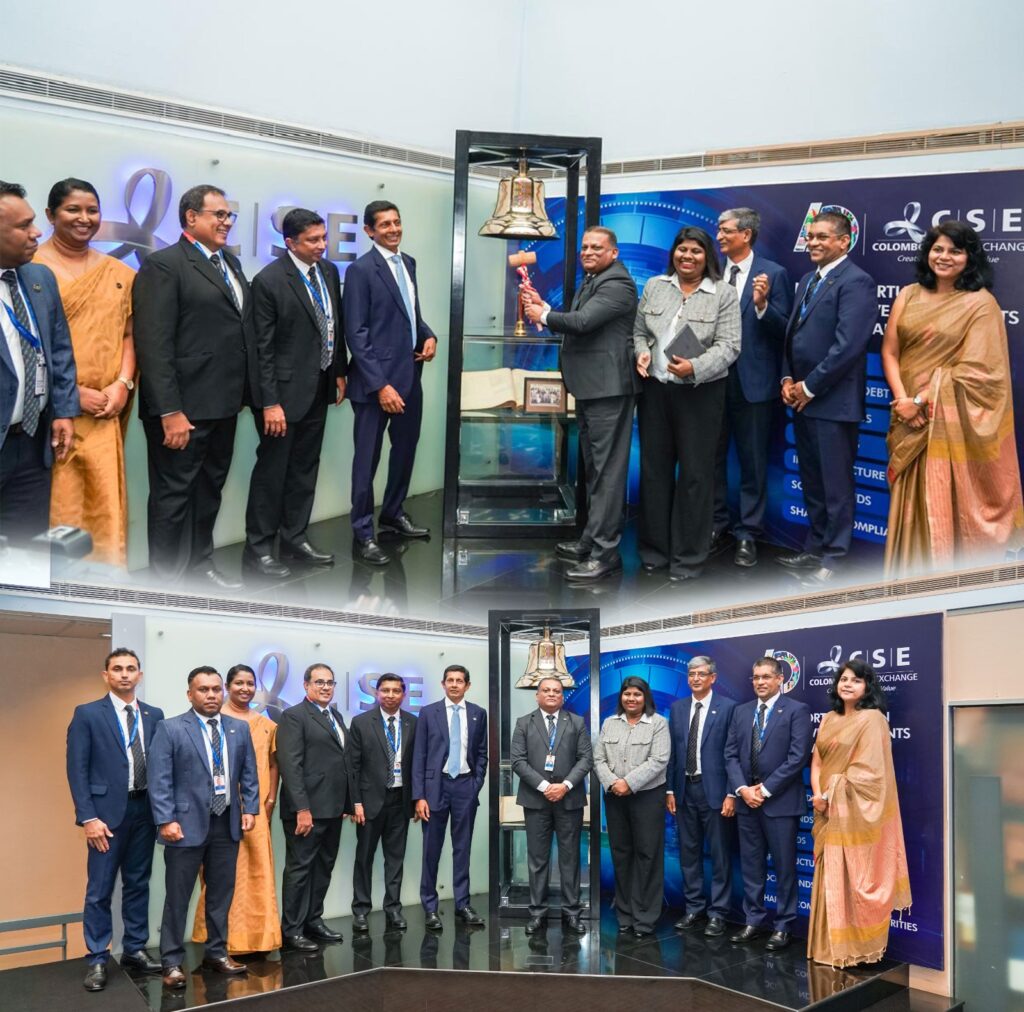
Shipwreck, Pollution, Bribes: X-Press Pearl Showdown of Corruption
Sri Lanka’s worst marine disaster, the X-Press Pearl catastrophe of 2021, has once again resurfaced in the public eye this time not for the environmental havoc it caused, but for the brazen refusal of its operators to pay the US$1 billion in damages ordered by the Supreme Court. The case exposes not only the fragility of international maritime law but also the disturbing possibility of political profiteering in Colombo’s corridors of power.
A Billion-Dollar Blaze at Sea
The Singapore-flagged container vessel MV X-Press Pearl caught fire off Colombo on May 20, 2021. Its cargo included 81 containers of hazardous chemicals notably nitric acid and lead ingotsalong with hundreds of tonnes of plastic pellets. Denied entry by ports in Qatar and India after reporting the acid leak, the vessel entered Sri Lankan waters, where it burned for nearly two weeks before sinking.
The aftermath was catastrophic. An 80-kilometre stretch of Sri Lanka’s western coast was inundated with microplastics, while fishing was banned for months, crippling livelihoods. A government-appointed expert panel later estimated the economic and environmental damage at US$6.4 billion, though some marine scientists argue the final bill could exceed US$15 billion once long-term losses to biodiversity, tourism, and fishing stocks are accounted for.
The Court Order and the Refusal
In July 2025, the Supreme Court ordered X-Press Feeders—the vessel’s operator—to pay US$1 billion in damages in three tranches, beginning with US$250 million by September 23. Yet, on the eve of the deadline, company CEO Shmuel Yoskovitz flatly rejected the order.
He argued that unlimited liabilities “undermine the entire base of maritime trade” and warned of a “dangerous precedent” that could raise global insurance premiums. The firm insists it has already spent US$170 million on wreck removal, beach clean-up, and compensation for fishermen, but maintains that any settlement must fall under international maritime conventions that cap liability.
Critics, however, point out that Sri Lankan courts found the company and its agents guilty of withholding crucial information, ignoring early warnings, and failing to prevent the disaster. For many, the company’s rejection is not a matter of principle but a calculated escape through legal loopholes.
Who Really Pays the Price?
While the shipping company invokes maritime law to limit exposure, Sri Lankan fishing families, tourism operators, and marine ecosystems bear the brunt. Scientists warn that the spill’s invisible scars microplastic contamination and coral reef damage will haunt the country for decades. The US$1 billion judgment itself is modest compared to the scale of losses, and refusing even that amount raises the spectre of injustice on a global stage.
Allegations of Political Profiteering
The scandal has also taken a darker turn. In 2023, then-Justice Minister Wijeyadasa Rajapakshe revealed evidence of a staggering US$250 million bribe allegedly paid to a Sri Lankan intermediary to derail litigation.
The revelations suggested possible involvement of figures tied to the Rajapaksa regime, though no convictions have followed. Reports also allege that insurers sought to influence officials to disrupt legal action, raising questions of whether sections of the political elite stood to benefit from the disaster.
If proven, such allegations mean Sri Lanka’s tragedy was not just ecological and economic—it became a political cash cow for those entrusted with protecting national interests.
Can X-Press Pearl Walk Away?
Legally, X-Press Feeders has secured an order from London’s Admiralty Court capping its liability at just £19 million, a fraction of the Sri Lankan court’s award. Enforcement of Sri Lanka’s judgment abroad will be difficult, with related litigation in Singapore and the UK dragging on until at least 2026.
But morally, the refusal to pay is indefensible. With damages running into billions, lives and livelihoods destroyed, and Sri Lanka’s reputation scarred, many argue that allowing the company to walk away would signal open season for polluters.
The Final Reckoning
The X-Press Pearl case is no longer just about one ship it is about whether global shipping giants can hide behind conventions to escape responsibility, and whether corrupt local actors will continue to trade national interest for personal gain. For Sri Lanka, the fight is not only for compensation but also for justice, transparency, and the principle that the polluter must pay.
Until then, the Indian Ocean remains a graveyard of accountability its waters poisoned, its people betrayed.
Litro Gas Tender Sparks Outcry over Hambantota Laugfs terminal Clause
Sri Lanka’s latest international tender for liquefied petroleum gas (LPG) procurement has ignited controversy after state-owned Litro Gas Lanka Ltd quietly inserted a last-minute clause that critics say tilts the process in favor of its main rival.
The tender, floated on August 27 and closed on September 23, seeks 380,000 metric tonnes (±20%) of LPG for 2026. But in the final stretch, Litro amended its conflict-of-interest section with a new provision that permits bidders to lease a competitor’s facility—the Hambantota LPG terminal—without Litro assuming responsibility for logistics until delivery at its own terminal.
The insertion, under Section 11, Clause 4.2 (new Clause VIII), appears on the surface to offer flexibility. In reality, energy analysts warn it could push suppliers toward infrastructure owned by LAUGFS Gas, Litro’s direct competitor.
“This is like forcing a state company’s suppliers to pay rent to its rival,” one industry expert said warning of long-term risks to transparency and national energy security.
Hambantota vs Kerawalapitiya
The controversy stems from the sharp disparity between the two companies’ facilities. Litro operates a modest 8,000 MT terminal at Kerawalapitiya and relies on frequent shipments to meet Sri Lanka’s 32,000 MT monthly domestic demand. In contrast, LAUGFS controls a state-of-the-art 30,000 MT terminal at Hambantota, in addition to a smaller 3,000 MT unit at Mabima, giving it superior storage and transshipment capacity.
By permitting bidders to rely on Hambantota, critics argue Litro risks embedding structural dependence on LAUGFS, undermining its own position as the national distributor. The move has also rekindled political debates over whether critical energy infrastructure should be controlled or leveraged by competitors.
Old Proposals, New Flashpoints
This is not the first time Hambantota’s terminal has been at the center of controversy. In 2021, the government considered a public-private partnership that would allow Litro and LAUGFS to jointly use the Hambantota facility. Proponents, led by LAUGFS Chairman W.K.H. Wegapitiya, argued the move could slash import costs by around US$70 per tonne and help stabilize retail prices.
Although a special committee was appointed to study feasibility, the proposal stalled amid political resistance and concerns about losing strategic control of the national LPG supply chain.
Tender Integrity at Risk
Procurement specialists have raised red flags about the process. They argue that any material change to tender conditions must be issued as a formal addendum and circulated to all bidders. By slipping in a new clause without proper procedure, Litro risks legal challenges before the Procurement Appeal Board or even in the courts.
For foreign suppliers, the clause poses operational risks, including higher costs and reduced flexibility. For consumers, fewer willing bidders could translate into higher LPG prices and greater supply vulnerability.
With Sri Lanka still grappling with energy affordability and security, the Hambantota clause has exposed a dangerous fault line: whether state procurement serves the public interest, or the commercial advantage of private players.

